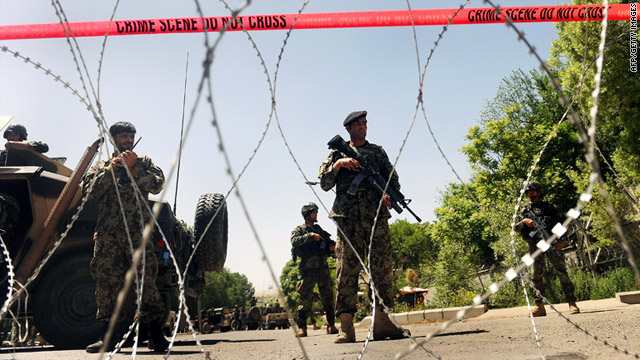
Members of the Afghan military on Saturday stand guard on the road that leads to the military hospital that was attacked.
In a memorandum to NATO's International Security Assistance Force, Gen. David Petraeus said it likely that insurgents will pursue such operations over the coming months in an attempt to demonstrate their ability to strike.
He called on international forces to balance their tactical needs with those of the civilian population.
"These attacks may increase the risk of civilian casualties and put Afghan and ISAF forces in difficult situations," Petraeus said in a memorandum made public Saturday.
"In the face of such enemy actions, we must continue our efforts to reduce civilian casualties to an absolute minimum."
The Kabul attack underscores Petraeus' warning.
Six people were killed and 26 others were injured in the bombing, according to Zahir Azimi, a ministry of defense spokesman.
A Taliban spokesman claimed responsibility. Zabiullah Mojahed told CNN that 51 people had died and two of the group's members carried out suicide attacks on the Charsd Bester military.
"One of them detonated inside the eating place, and the second one was shot to death, and now the operation is over," he said.
"As a result, 51 people (have) been killed, including foreigners."
Afghan President Hamid Karzai deplored the action, and ISAF spokesman Rear Adm. Vic Beck, called the strike "abhorrent," saying it "represents the lowest, most cowardly attack."
The Sardar Mohammad Daud Khan Hospital, a 400 bed-hospital, is the largest medical military facility in the country and provides medical services to Afghan soldiers and their families, the U.N. Assistance Mission in Afghanistan said.
The strike occured when medical students where at lunch, and the United Nations emphasized that international humanitarian law bans attacks on medical workers and hospitals.
"All medical personnel and facilities must be respected and protected in all circumstances. Further, directing an attack against a zone established to shelter wounded and sick persons, and civilians from the effects of hostilities, is also illegal and prohibited. As parties to the conflict, all anti-government elements have clear responsibilities under international humanitarian law to protect civilians and to not attack them," the U.N. Afghan mission said in a statement.
Petraeus' memorandum, posted on the ISAF website, comes as the Taliban and al Qaeda have claimed responsibility for an increased number of attacks against security forces in Afghanistan and U.S. targets in Pakistan.
Both groups have said many of the attacks were in retaliation after U.S. commandos killed Osama bin Laden this month.
Petraeus ordered forces to review civilian casualty directives, saying troops must achieve "the proper balance between aggressiveness and patience."
Anger in Afghanistan and Pakistan over civilian casualties has mounted in recent months following NATO air strikes that have killed dozens along their shared border.
In March, Defense Secretary Robert Gates offered a personal apology to Afghan President Hamid Karzai for the killings of nine boys in a helicopter attack targeting insurgents.
The apology came after Karzai said one made earlier by Petraeus was insufficient.
Weeks later, the international force said civilians were accidentally killed during a NATO airstrike in Afghanistan's Helmand province. The target was two vehicles believed to be carrying a Taliban leader, ISAF said.
Petraeus' warning also comes as he must decide on the number of troop reductions in Afghanistan to meet President Barack Obama's self-imposed deadline to begin withdrawing U.S. forces by July.
The president has repeatedly said he is confident the United States can meet the self-imposed deadline without compromising Afghan security, though military commanders and government officials have raised concern about the readiness of Afghan security forces.
Petraeus testified earlier this year before Congress about the plans, saying he was likely to recommend that some combat troops be among the first to return to the United States.
He has said significant progress has been made against the Taliban over the past five years. But he also has warned the progress is "fragile and reversible."
"We are at a pivotal moment in our work here, and I believe it would be valuable for every leader in ISAF to reread these documents and to internalize and employ the principles in them," Petraeus said in memorandum dated May 15, 2011.








0 comments